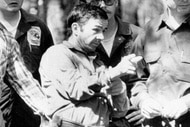Create a free profile to get unlimited access to exclusive videos, breaking news, sweepstakes, and more!
How The Police Acronym N.H.I. — 'No Humans Involved' — Dehumanized Sex Workers
Netflix's “Crime Scene: The Times Square Killer” shows how cops' use of the acronym "no humans involved" hurt investigations into the killer's victims.

It’s no secret that, throughout history, sex workers have been dehumanized by both police and society. But a relatively modern police acronym was used to denote those deemed not important enough to be considered legitimate victims of crime — including sex workers.
In “Crime Scene: The Times Square Killer,” veteran filmmaker Joe Berlinger points out that police in the New York City region would sometimes use the unofficial term “no humans involved” (N.H.I.) to describe the deaths of sex workers, transients, drug users, people of color and other people they did feel worthy of investigation. He claims that this unofficial police practice of the 1970 and 80s allowed serial killers like Richard Cottingham, who preyed upon sex workers, to get away with their horrendous killing sprees.
“For decades, the bodies of sex workers were found in dumpsters or back alleys and they would say ‘no humans involved’ and they wouldn’t investigate these cases,” Berlinger told Oxygen.com.
The acronym was also used by police for some of the victims of serial killer Lonnie Franklin, dubbed the “Grim Sleeper,” Vanity Fair reported — likely because he killed people who were Black and used drugs. Franklin is known to have killed people in Los Angeles from 1984 to 2007.
“Certain sections of the LAPD perceive these people as their enemies,” Nick Broomfield, the director of “Tales of the Grim Sleeper,” told the outlet in 2014. “They consider them to be nonhumans, not in any way a useful section of the community. This behavior [dubbing people as nonhuman] wouldn’t be tolerated for a minute in a white, affluent neighborhood."
Berlinger told Oxygen.com that many of serial killer Samuel Little’s victims in the 1980s were also similarly dehumanized, because they were often non-white sex workers who used drugs. In his previous docuseries "Confronting a Serial Killer," he features interviews with sex worker survivors of Little, who explained how they were also victimized by the system.
As the series pointed out, Little got away with killing for decades — he is believed to have killed more than 100 people — because of whom he targeted.
The practice of referring to certain crime victims as not human of was only brought to light in 1992 following the Rodney King beating. Author Sylvia Wynter criticized it in a 1994 essay, noting that the “social effects” of this acronym could be perceived as making “genocidal effects with the incarceration and elimination of young Black males by ostensibly normal, and everyday means.”
Berlinger is certain that the scope of murders in America has been skewed because of the acronym.
"It’s shocking how many Jane Doe victims and unidentified bodies have been found," he told Oxygen.com. "There is an astounding amount of victims who we don’t know who they are or who killed them and they are generally people in the sex work business. It’s shocking. There’s been an epidemic of sex workers being killed in the past three decades and of society looking the other way."
Beyond the unofficial practices aside, even the official laws have also made it easier for serial killers to prey on sex workers.
“The unofficial policy of no human involved is particularly disturbing, but the official laws that existed as well did a terrible job of keeping sex workers out of trouble,” Berlinger told Oxygen.com. “They were criminalized and it was a lot easier to round up and criminalize the sex workers than to go hunt a serial killer.”
"Crime Scene: The Times Square Killer" points out that New York City sex workers in the 1980s who reported a sexual assault were often arrested on prostitution charges.
He says that while there's been progress since N.H.I. was used, there is still a stigma to sex work.
“They may not do that anymore but they aren’t going to put as much resources in it,” he said. “If a sex worker is found somewhere even today, it's not going to be treated as important. We need to evolve as a society.”

























